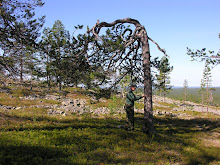Last week I attended a PhD students' workshop. The final part of the workshop was dedicated to discussing motivation and supervision issues. The simple question was: what motivates you to work on your PhD (or, for older guys, on your research)?
The results were diverse. For some young people, starting a PhD had been "the easy, lazy choice" to earn an income - no need to go through the trouble of finding "a real job" and the possibility to continue the lifestyle of a student for a few more years. A few students were also motivated by the feeling that their research is important.
However, the most interesting replies came from senior scientists. A well-known male scientist said that the driving factor for his research was pure interest in his research question - the social framework was less important. A well-known female scientist, on the other hand, argued that group synergy and an inspiring atmosphere created by her colleagues (or students) was a key factor driving her research.
I am certainly not trying to suggest that men are always interested in technical details and women in other people and social issues. Nevertheless, the contrast between the answers was clear and has, in my mind, fundamental consequences in the way our research team is currently run.
What motivates me? A dynamic group. The chance to work with sharp, kind or inspiring people. To be honest, the research theme is less important than the social framework. Many, many research questions are important enough to deserve my attention - as long as I work on a diverse team.
I would never have started working in research if I had not been offered a chance to work in an international environment with people having different backgrounds (both professionally and culturally). When I entered university, my goal was to be back in the tropics or mild climates of my school years by the age of 25. I was not aiming for a PhD, only for an MSc. Well, here I am, still in the North and with a PhD and more than 25 years of my life completed. And I would not be here, if it had not been for the international MODIS LAI campaign I was employed to work in as an undergraduate student nine years back in June 2000.
So, what am I trying to say? I think supervisors should not only offer interesting measurements or research questions to their students, but also go through the small trouble of organizing social contacts or providing an international framework. In the end, that might prove to be the most important thing in attracting the attention and dedication of many students. For me it was.
The results were diverse. For some young people, starting a PhD had been "the easy, lazy choice" to earn an income - no need to go through the trouble of finding "a real job" and the possibility to continue the lifestyle of a student for a few more years. A few students were also motivated by the feeling that their research is important.
However, the most interesting replies came from senior scientists. A well-known male scientist said that the driving factor for his research was pure interest in his research question - the social framework was less important. A well-known female scientist, on the other hand, argued that group synergy and an inspiring atmosphere created by her colleagues (or students) was a key factor driving her research.
I am certainly not trying to suggest that men are always interested in technical details and women in other people and social issues. Nevertheless, the contrast between the answers was clear and has, in my mind, fundamental consequences in the way our research team is currently run.
What motivates me? A dynamic group. The chance to work with sharp, kind or inspiring people. To be honest, the research theme is less important than the social framework. Many, many research questions are important enough to deserve my attention - as long as I work on a diverse team.
I would never have started working in research if I had not been offered a chance to work in an international environment with people having different backgrounds (both professionally and culturally). When I entered university, my goal was to be back in the tropics or mild climates of my school years by the age of 25. I was not aiming for a PhD, only for an MSc. Well, here I am, still in the North and with a PhD and more than 25 years of my life completed. And I would not be here, if it had not been for the international MODIS LAI campaign I was employed to work in as an undergraduate student nine years back in June 2000.
So, what am I trying to say? I think supervisors should not only offer interesting measurements or research questions to their students, but also go through the small trouble of organizing social contacts or providing an international framework. In the end, that might prove to be the most important thing in attracting the attention and dedication of many students. For me it was.

